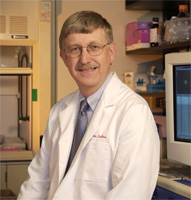 Francis S. Collins has long been known in the science world for his leadership of the Human Genome Project, an ambitious 13-year joint endeavor by the National Institutes of Health and the U.S. Department of Energy to identify all of the approximately 20,000 to 25,000 genes in human DNA. The project ended successfully in 2003, guaranteeing Collins' place in history as a vital contributor to the progress of genetic research.
Francis S. Collins has long been known in the science world for his leadership of the Human Genome Project, an ambitious 13-year joint endeavor by the National Institutes of Health and the U.S. Department of Energy to identify all of the approximately 20,000 to 25,000 genes in human DNA. The project ended successfully in 2003, guaranteeing Collins' place in history as a vital contributor to the progress of genetic research.
More recently, however, Collins has been making a name for himself in a different realm -- that of religion. As an evangelical Christian and advocate for the peaceful coexistence of faith and science, Collins is a controversial and puzzling figure for many. Conservatives call him a heretic for suggesting that Darwinian evolution is not just truth, but God's truth, and liberals protested his appointment last summer as head of the National Institutes of Health, claiming his faith makes him unfit to be the director of a major scientific organization. In this interview, Collins addresses the concerns from both sides, and shares how studying DNA sequences is not just research for him, but worship.
Here are some excerpts from the interview:
What is your vision for your new role as NIH director?
I am greatly honored to have been asked by President Obama to serve in this role. With an annual budget of $30 billion, the NIH is the largest supporter of biomedical research in the world. I hope to steer this remarkable ship of discovery toward new understanding of the details of how life works, and how disease can strike when things go wrong
Got something to say about what you're reading? We value your feedback!